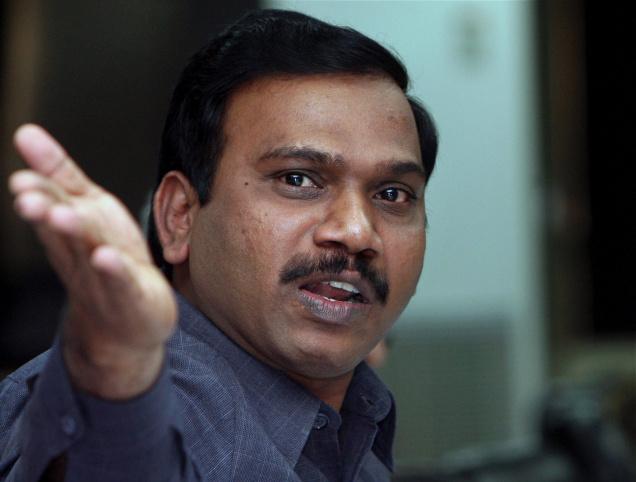
New Delhi, Nov 8: Former Telecom Minister A Raja and other accused in the 2G scam today pushed for a stay on the proceedings of the case in a Delhi court in the wake of the ruling of the Gauhati High Court holding as "unconstitutional" the setting up of the CBI.
In a related development, Congress leader Sajjan Kumar wanted the court to declare as "illegal" the probe and charge sheets filed by the CBI in a 1984 anti Sikh riots case against him in the wake of the High Court verdict.
Raja and other 2G accused including top corporate executives said continuance of the trial in the case which has been probed by CBI would amount to contempt of court.
"Before we proceed today I want to mention that the nation today woke up with banner headlines in newspapers that the CBI is not police.
"By coincidence the chief Investigating Officer happens to be in the court today and in view of the Gauhati High Court judgement we should not proceed with the proceedings otherwise it would be a contempt of court," Majeed Memom, appearing for accused Swan Telecom Promoter Vinod Goenka, told the court.
"Sir, I can show you the judgement here," Raja's counsel Manu Sharmahe told Special CBI Judge O P Saini who declined their oral plea to halt the trial and went on with the testimony of Chief Investigating Officer and CBI SP Vivek Priyadarshi.
"I have read the newspaper but I cannot go by the media reports," the judge said.
At the end of the day, the defence lawyers placed before the court judgement of the high court and said they will move a formal application in this regard in the court on Monday.
In its judgement, the High Court has struck down the 1963 resolution through which the Central Bureau Investigation (CBI) was set up and held all its actions "unconstitutional".
The Centre has decided to file an appeal in the Supreme Court against the High Court verdict.
Kumar's counsel mentioned the judgement before District Judge J R Aryan and said if CBI itself is unconstitutional, its probe and charge sheets are also illegal.
The judge, however, said the effect of this judgement is not clear at this stage as it is too early and asked the counsel to proceed with the case which will now come up for hearing on November.
The court had earlier framed various charges including murder and rioting against Kumar, Brahmanand Gupta, Peru, Khushal Singh and Ved Prakash in connection with killing of a man in Sultanpuri area in the riots that had occurred after the assassination of the then Prime Minister Indira Gandhi on October 31, 1984. Accused Khushal Singh has died.





Comments
Add new comment